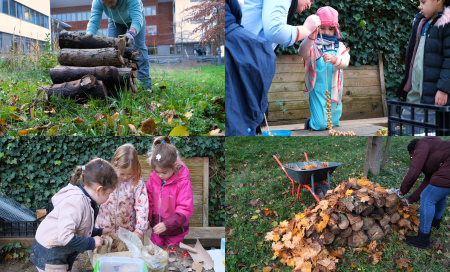
Area characterisation:
Paris region is an area of 12 012 km² and 12,21 millions inhabitants (2019) located in the northern middle of France. The centre of the region is characterized by a very dense urban area subject to heat-island effect, pollution (air, water and soil), noise pollution and lack of green spaces. The rest of the region (Peripheral area of the region) is composed of forests and agricultural areas where issues are different. In these areas, the lack of nature is mostly related to agricultural intensification and urbanisation.
The development of NbS in there area is crucial to deal with the various problems associated with urban development and agricultural transformations. Renaturation is one of the axis we focus the most on in our programs and a lot of improvement has to be noted in this field. It is however still the very beginning of the change we need to act toward the vital changes we need to implement in the region.
Objective:
Vigie-Nature École is a biodiversity monitoring program focused on multiple groups of organisms. The primary goals of this data collection is to provide data to researchers in urban ecology and provide education to children in all the subjects related to biodiversity that we can cover. Our last development focuses on actions that pupils or children can take in order to improve both biodiversity and well-being within the schools.
Financing:
Vigie-Nature École has been funded by a large variety of organisms and research grants.
MNHN
Fondation d’entreprise Hermès
French minitry of education
Office Français de la biodiversité
REGREEN project funded under Horizon H2020
NBSEduWorld project funded under Horizon Europe
Potential impacts/benefits:
Specific to educational impacts and benefits as a result of the case study actions
Having more habitats for biodiversity within a school is also beneficial to promote gender equality (better space sharing compare to full concrete courtyards that become sport field only and are often more used by boys).
More habitats means more materials and these materials can lead to a better motor development and sensitivity for younger children
De-paving courtyards improves water infiltration and contribute to the reduction of the heat-island effect
Observation of biodiversity improves the chances that children can imagine their own NbS
The monitoring of biodiversity can allow children to quantity the effect of the NbS and develop critical thinking
The 12 competencies are part of the GreenComp framework accessible here: https://publications.jrc.ec.europa.eu/repository/handle/JRC128040
GreenComp framework for Case study:-
-Embodying sustainability values, including the competences
☒valuing sustainability
☐supporting fairness
☒promoting nature
- Embracing complexity in sustainability, including the competences
☒systems thinking
☒critical thinking
☒problem framing
- Envisioning sustainable futures, including the competences
☒futures literacy
☒adaptability
☒exploratory thinking
- Acting for sustainability, including the competences
☐political agency
☒collective action
☒individual initiative
Transferability of result:
The project Vigie-Nature École can be directly transferred to neighbouring countries and with some modification of the protocols to the whole Europe. Translation of the specific part on NbS in the different country teaching languages is however mandatory.
Tools, results and data can help building NbS education programs and could allow us to extend the results in other region with other issues that NbS could help solve.
Lessons learnt:
Generic take-home messages referring to the objective e.g. related to the process of imparting education and awareness: the used process or the methods used.
Education with the Vigie-Nature École program has shown positive effects on the willingness of kid to increase the quantity and the diversity of natural elements within their schools or gardens. Multiple school are now implementing facilities that favour biodiversity at different scales with effect for example on gender equality (better sharing of the space in courtyards).
Organisations:
MNHN
NBSEduWorld Partners
Global goals:
-
4. Quality education
-
5. Gender Equality
-
13. Climate action
-
15. Life on land
NBS goals:
- Nature-based solutions for improving well-being in urban areas
- Establishing nature-based solutions for coastal resilience
- Multi-functional nature-based watershed management and ecosystem restoration
- Increasing carbon sequestration through nature-based solutions
NBS benefits:
- Developing climate change adaptation; improving risk management and resilience
- Increase infiltration / Water storage
- Developing climate change mitigation
- More energy efficient buildings
- Restoring ecosystems and their functions
- Greater ecological connectivity across urban regenerated sites
- Improve connectivity and functionality of green and blue infrastructures
- Increase achievements of biodiversity targets
- Increase Biodiversity
- Increase quality and quantity of green and blue infrastructures
- Increased cultural richness and biodiversity
- Changing image of the urban environment
- Increase accessibility to green open spaces
- Increase amount of green open spaces for residents
- Increase awareness of NBS solution & their effectiveness and co benefits
- Increase communities’ sense of ownership
- Increase stakeholder awareness & knowledge about NBS
- Increase well-being
- Increase willingness to invest in NBS
- Social learning about location & importance of NBS
- Sustainable development of coastal regions
Publications and reports:
https://journals.openedition.org/rdst/2041
https://www.cairn.info/revue-cahiers-de-l-action-2016-1-page-35.htm
https://journals.openedition.org/ere/4440
https://www.sciencedirect.com/science/article/pii/S1470160X23004119
https://www.vigienature-ecole.fr/